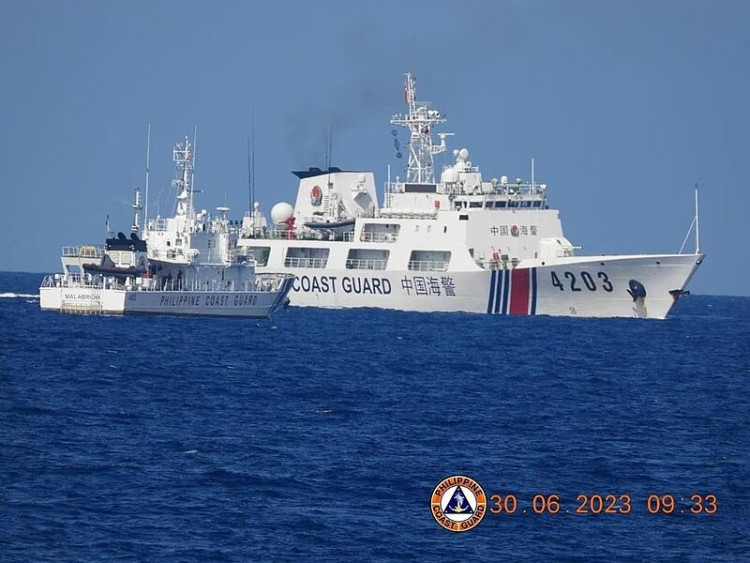In a dramatic escalation of tensions in the South China Sea, the Philippines and China found themselves at odds once again over a maritime incident near the disputed Sabina Shoal. On Sunday, a Philippine resupply mission for its fishermen turned into a confrontation with Chinese vessels, further straining the fragile relationship between the two nations despite recent efforts to rebuild trust.
The Philippines accused China of executing "aggressive and dangerous maneuvers" to block its Bureau of Fisheries ship, which was on a mission to deliver food, fuel, and medical supplies to Filipino fishermen. According to the Philippine South China Sea task force, the Chinese coast guard deployed water cannons and engaged in ramming tactics against the Philippine vessel, leading to engine failure and the premature termination of the mission.
"This unprofessional, aggressive, and illegal behavior by Chinese vessels poses a serious risk to the safety of our crew and the fishermen they serve," the Philippine task force declared in a strongly worded statement. The task force called on Beijing to halt its "provocative actions that destabilize regional peace and security."
China, however, presented a different version of events. The Chinese coast guard claimed that the Philippine ship had "illegally" entered Chinese waters and deliberately collided with one of its law enforcement vessels. In a statement, the Chinese coast guard said it had taken "control measures" to manage the situation and that responsibility for the collision lay entirely with the Philippine side.
The clash occurred near Sabina Shoal, an area of strategic importance in the South China Sea, where multiple nations, including the Philippines and China, lay competing territorial claims. The region has long been a flashpoint for military and diplomatic tensions, with China's sweeping claims over nearly all of the South China Sea often bringing it into conflict with other claimants like the Philippines, Taiwan, Malaysia, Indonesia, Vietnam, and Brunei.
Despite an international arbitral tribunal ruling in 2016 that Beijing's claims had no legal basis, China has continued to assert its sovereignty over the area, deploying a large fleet of vessels to enforce its control. This has led to numerous confrontations, with Sunday's incident being the latest in a series of encounters between the two nations' naval forces.
In recent months, both countries had made tentative steps toward easing tensions. A high-level meeting last month saw both sides agree to "restore trust" and "rebuild confidence" in managing their maritime disputes. This agreement included a provisional arrangement regarding the Philippines' resupply missions to a beached Filipino naval ship in the South China Sea. However, the latest clash underscores the fragility of these efforts and the persistent volatility in the region.
The United States, a treaty ally of the Philippines, was quick to reiterate its support for Manila in the wake of Sunday's confrontation. U.S. Ambassador to the Philippines MaryKay Carlson took to social media to condemn China's actions, labeling them as "unsafe, unlawful, and aggressive conduct" that endangered lives during a legal Philippine mission.
This incident follows a similar confrontation just a week earlier, in which Philippine coast guard ships were damaged after collisions with Chinese vessels near the same shoal. The repeated nature of these clashes has heightened concerns about the potential for a more serious military conflict, particularly as both nations refuse to back down from their respective positions.
The situation has been further complicated by reports of China firing flares at a Philippine patrol aircraft near Scarborough Shoal, another contested area, just days before the Sabina Shoal incident. These actions have raised alarms not only in Manila but also in Washington, where U.S. officials are closely monitoring the developments.
As tensions continue to simmer in the South China Sea, the possibility of an accidental escalation into a broader conflict looms large. The region's importance as a vital maritime trade route and its strategic military significance make it a critical area of concern for global powers. The upcoming visit of U.S. National Security Adviser Jake Sullivan to China, where he is expected to meet with Chinese Foreign Minister Wang Yi, will likely include discussions on the South China Sea, among other pressing issues.
Reuters and SCMP contributed to this report.






